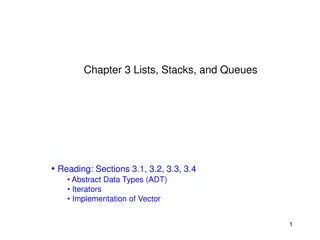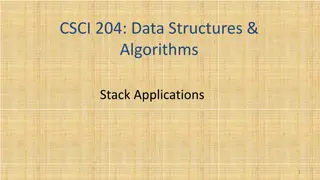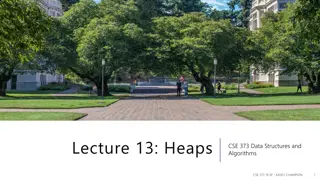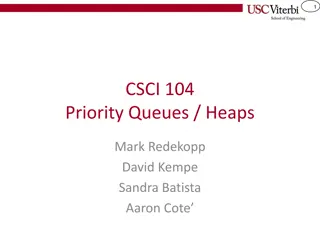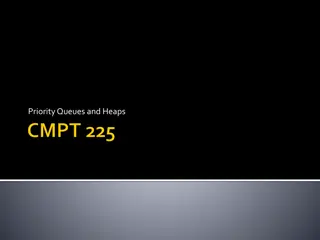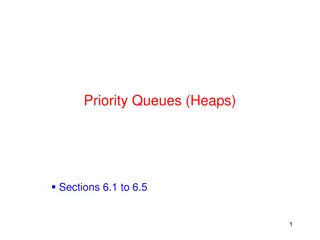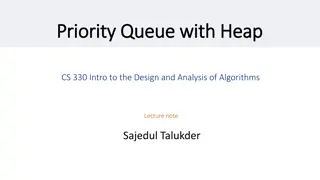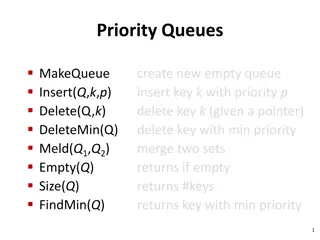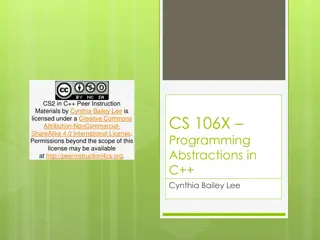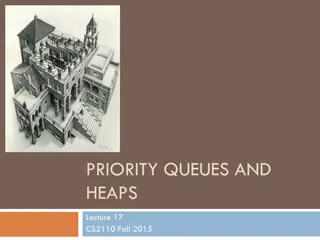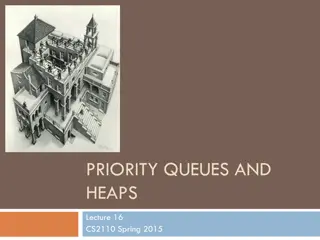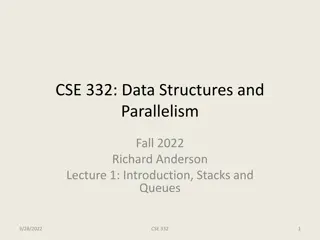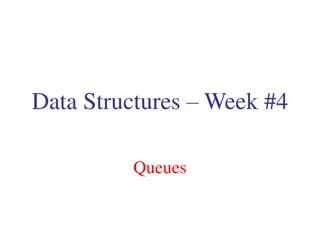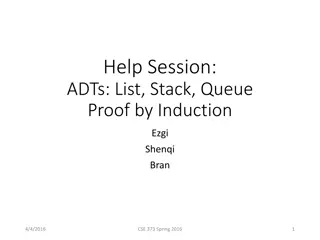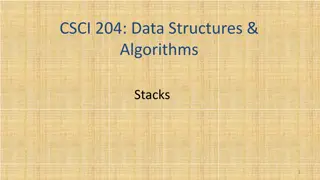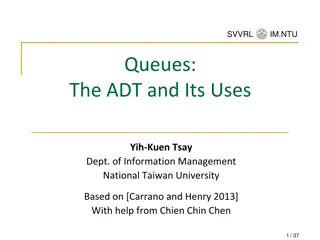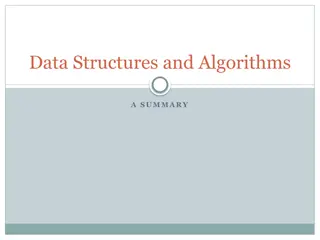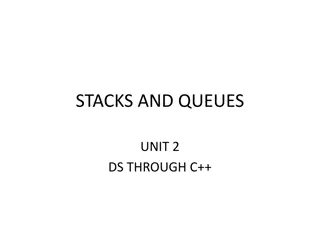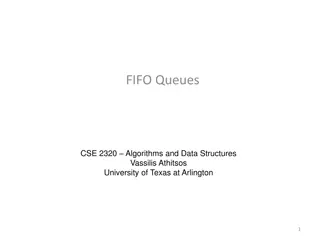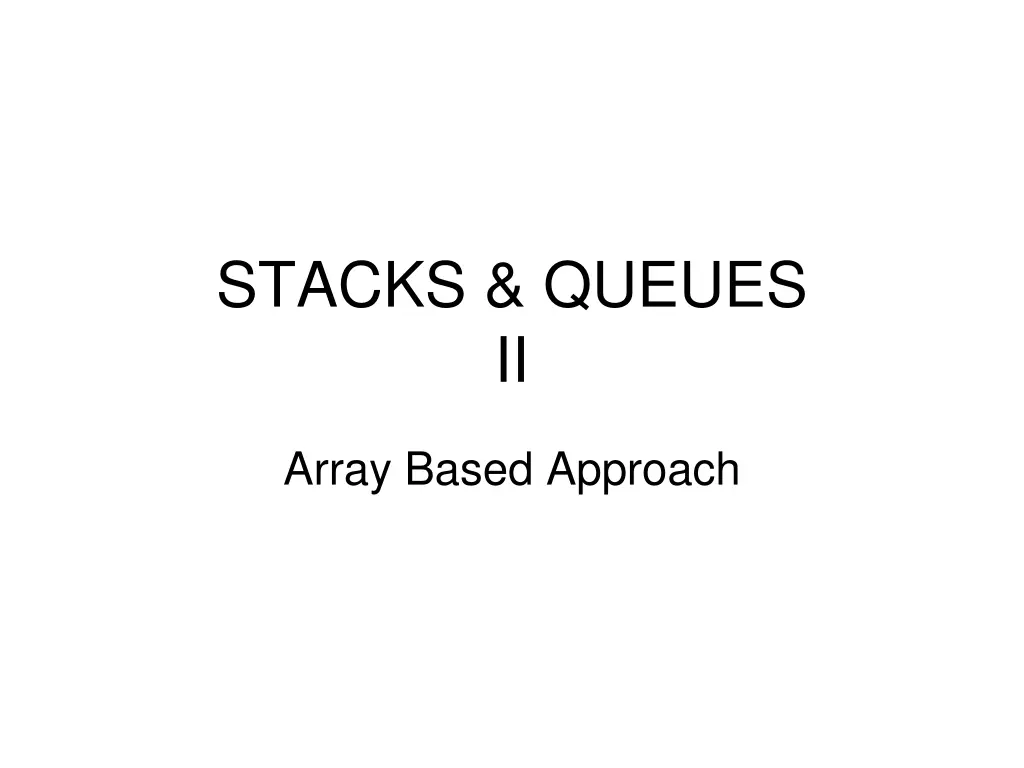
Array Implementation of Stacks and Queues
"Learn about implementing stacks and queues using arrays in C programming. Understand how to handle pop operations, prevent errors, and ensure stack operations are executed correctly. Dive into practical examples and explore the simplicity and efficiency of array-based approaches."
Download Presentation

Please find below an Image/Link to download the presentation.
The content on the website is provided AS IS for your information and personal use only. It may not be sold, licensed, or shared on other websites without obtaining consent from the author. If you encounter any issues during the download, it is possible that the publisher has removed the file from their server.
You are allowed to download the files provided on this website for personal or commercial use, subject to the condition that they are used lawfully. All files are the property of their respective owners.
The content on the website is provided AS IS for your information and personal use only. It may not be sold, licensed, or shared on other websites without obtaining consent from the author.
E N D
Presentation Transcript
STACKS & QUEUES II Array Based Approach
Stacks(cont.) Pop operation should not be applied to the empty stack Before applying pop operation to the stack ensure that the stack is not empty(us isEmpty() operation prior to pop operation)
Notes on Array Implementation As we shall see there are several ways to implement stack in C. The most popular solution which is using array is the simplest of these. The only potential hazard with array implementation is that we need to declare an array size ahead of time. Although array can not be stack, it can be home of stack. Array can be declared for the maximum size of the stack. Also another field is needed that, at each point during the operations on stack, keeps track of the current position.
Stack: top: #define MAXSTACK 20 entry: struct StackRec { int top; float entry[MAXSTACK]; }; . . . typedef struct StackRec Stack;
#includestack.h #include<stdio.h> int main() { Stack s; initializeStack(&s); push(&s,4.9); push(&s,15); if(!stackEmpty(&s)) printf( \n %f , pop(&s)); else printf( \n Stack is empty ); }
Application A program that check whether everything is balanced. Thus every } must correspond to { . Brackets and parentheses must correspond to their left counterparts. The sequence { [ ] } is legal, but { [ } ] is not. For simplicity just check for balancing of Parentheses, brackets and braches. Ignore any other character appears.
Simple Algorithm uses stack Make an empty stack, Read characters until end of file(or end of string). If the character is an open anything( { , ( , [ ) push it onto stack. If it s a close anything, then If the stack is empty report an error (unbalanced) Otherwise, pop the stack. If the symbol popped is not the corresponding opening symbol, then report an error. At the end of string or file, if the stack is not empty report an error
Example Assume imput string contains (()} First characters is ( then push character to stack Read next characters it is again ( then push character to stack Read next characters it is ) then since stack is not empty pop item from the stack and check if item ( (
Example Assume imput string contains (()} First characters is ( then push character to stack Read next characters it is again ( then push character to stack Read next characters it is ) then since stack is not empty pop item from the stack and check if item pop and check ( ( Since corresponding closing symbol is popped Continue operation without error mesage
Example Assume imput string contains (()} First characters is ( then push character to stack Read next characters it is again ( then push character to stack Read next characters it is ) then since stack is not empty pop item from the stack and check if item Read next characters, which is }. Since it is close anything Pop is performed. (
Example Assume imput string contains (()} First characters is ( then push character to stack Read next characters it is again ( then push character to stack Read next characters it is ) then since stack is not empty pop item from the stack and check if item Read next characters, which is }. Since it is close anything Pop is performed. Since ( is not corresponding open symbol for } report An error and terminate the application. (
#include stack.h //macro definitions #define isOpen(ch) (ch=='{' || ch=='[' || ch=='(') #define isClose(ch) (ch=='}' || ch==']' || ch==')' ) void readExp(char exprs[]) { char ch; int i=0; printf("\nEnter Expression:"); scanf("%[^\n]s",exprs); }
int isBalanced(char exp[]) { int i=0; char symb; struct stack s; createStack(&s); while(exp[i]!='\0'){ }//end while if(isEmpty(&s) ) return YES; return NO; }//end function if(isOpen(exp[i]) ) else if(isClose(exp[i]) ){ if(isEmpty(&s) ) symb=pop(&s); switch(symb){ }//end switch }//end if i++; push(&s,exp[i]); return NO; case '{': if(exp[i]!='}') case '[': if(exp[i]!=']') case '(': if(exp[i]!=')') break; return NO; break; return NO; break; return NO;
void main() { is balanced"); is not balanced"); } char expr[50]; readExp(expr); if(isBalanced(expr) ) printf("\n The expression else printf("\n The expression
Homework Write a program to read postfix expression (assume the postfix expression entered is valid) and display fully parenthesized infix version of the expression. (assume only single digit number are allowed) Ex: 13+4*85/- The fully parenthesized infix version of the expression above is: ( ( ( 1+3 ) *4 ) - ( 8/5 ) ) the following are the prototypes of functions you should develop; void readPostfix(char []); void dispFully(char []);
Hints about homework typedef struct stack{ int top; char items[MAX][30]; } STACK ; void push(STACK *s, char str[]) { if(s->top==MAX-1){ printf("\n Stack Overflow \n"); exit(1); } else{ (s->top)++; strcpy(s->items[s->top],str); } } /* Pop Implementation */ void pop(STACK *s,char str[]) { if(isEmpty(s) ){ printf("\n Stack Underflow \n"); } strcpy(str,s->items[s->top]); (s->top)--; } exit(1);
QUEUE A queue is simply a waiting line that grows by adding elements to its end and shrinks by removing elements from the front. Compared to stack, it reflects the more commonly used in real-world, namely, first come, first served . Waiting lines in supermarkets, banks, food counters are common examples. A formal definition of queue would be a list from which items may be deleted at one end (front) and into which items may be inserted at the other end (rear). It is also referred to as a first-in-first-out (FIFO) data structure. Queues are good whenever we have to wait in line Queues are fair Queues have many applications in computer systems: jobs in a single processor computer print spooling information packets in computer networks.
The first element inserted into a queue is the first element to be removed. For this reason queue is called first in first out (FIFO). delete Rear Front insert
QUEUE Primitive operations enqueue(q, x): inserts item x at the rear of the queue q x = dequeue(q): removes the front element from q and returns its value. isEmpty(q) : Check to see if the queue is empty. isFull(q) : checks to see if there is space to insert more items in the queue.
Enqueue Operation Insert 8 8 Rear Front
Enqueue Operation Insert 10 Insert 860 Insert -60 Insert 8 10 860 -60 Rear Front 8
Enqueue Operation Insert 10 Insert 860 Insert -60 Insert 8 10 -60 Rear Front 860 8
Enqueue Operation Insert 10 Insert 860 Insert -60 Insert 8 10 Rear Front -60 860 8
Enqueue Operation Insert 10 Insert 860 Insert -60 Insert 8 Rear Front 10 -60 860 8
Insert 10 Insert 860 Insert -60 Insert 8 Rear Front 10 -60 860 8 Dequeue Operation
Insert 10 Insert 860 Insert -60 Insert 8 Rear Front 10 -60 860 8 Dequeue Operation
Insert 10 Insert 860 Insert -60 Insert 8 Rear Front 10 -60 860 8 Dequeue Operation
Insert 10 Insert 860 Insert -60 Insert 8 Rear Front 10 -60 860 8 Dequeue Operation
Insert 10 Insert 860 Insert -60 Insert 8 Rear Front 10 -60 860 8 Dequeue Operation
Example Consider the following sequence of operations being performed ona queue q which stores integers: 1. enqueue(q, 9); 2. enqueue(q, 10); 3. enqueue(q, 50); 4. x = dequeue(q); 5. Print(x) 6. enqueue(q, 20); 7. enqueue(q, -40); 8. x = dequeue(q); 9. Print(x) 10.enqueue(q, 40); 11.x = dequeue(q); 12.Print(x) 13.enqueue(q, 30);
Example Consider the following sequence of operations being performed ona queue q which stores integers: 1. enqueue(q, 9); 2. enqueue(q, 10); 3. enqueue(q, 50); 4. x = dequeue(q); 5. Print(x) 6. enqueue(q, 20); 7. enqueue(q, -40); 8. x = dequeue(q); 9. Print(x) 10.enqueue(q, 40); 11.x = dequeue(q); 12.Print(x) 13.enqueue(q, 30);
Example Consider the following sequence of operations being performed ona queue q which stores integers: 1. enqueue(q, 9); 2. enqueue(q, 10); 3. enqueue(q, 50); 4. x = dequeue(q); 5. Print(x) 6. enqueue(q, 20); 7. enqueue(q, -40); 8. x = dequeue(q); 9. Print(x) 10.enqueue(q, 40); 11.x = dequeue(q); 12.Print(x) 13.enqueue(q, 30); 9 F r o n t R e a r
Example Consider the following sequence of operations being performed ona queue q which stores integers: 1. enqueue(q, 9); 2. enqueue(q, 10); 3. enqueue(q, 50); 4. x = dequeue(q); 5. Print(x) 6. enqueue(q, 20); 7. enqueue(q, -40); 8. x = dequeue(q); 9. Print(x) 10.enqueue(q, 40); 11.x = dequeue(q); 12.Print(x) 13.enqueue(q, 30); 9 10 F r o n t R e a r
Example Consider the following sequence of operations being performed ona queue q which stores integers: 1. enqueue(q, 9); 2. enqueue(q, 10); 3. enqueue(q, 50); 4. x = dequeue(q); 5. Print(x) 6. enqueue(q, 20); 7. enqueue(q, -40); 8. x = dequeue(q); 9. Print(x) 10.enqueue(q, 40); 11.x = dequeue(q); 12.Print(x) 13.enqueue(q, 30); 9 10 50 F r o n t R e a r
Example Consider the following sequence of operations being performed ona queue q which stores integers: 1. enqueue(q, 9); 2. enqueue(q, 10); 3. enqueue(q, 50); 4. x = dequeue(q); 5. Print(x) 6. enqueue(q, 20); 7. enqueue(q, -40); 8. x = dequeue(q); 9. Print(x) 10.enqueue(q, 40); 11.x = dequeue(q); 12.Print(x) 13.enqueue(q, 30); 10 50 9 F r o n t R e a r Output
Example Consider the following sequence of operations being performed ona queue q which stores integers: 1. enqueue(q, 9); 2. enqueue(q, 10); 3. enqueue(q, 50); 4. x = dequeue(q); 5. Print(x) 6. enqueue(q, 20); 7. enqueue(q, -40); 8. x = dequeue(q); 9. Print(x) 10.enqueue(q, 40); 11.x = dequeue(q); 12.Print(x) 13.enqueue(q, 30); 10 50 20 F r o n t R e a r Output 9
Example Consider the following sequence of operations being performed ona queue q which stores integers: 1. enqueue(q, 9); 2. enqueue(q, 10); 3. enqueue(q, 50); 4. x = dequeue(q); 5. Print(x) 6. enqueue(q, 20); 7. enqueue(q, -40); 8. x = dequeue(q); 9. Print(x) 10.enqueue(q, 40); 11.x = dequeue(q); 12.Print(x) 13.enqueue(q, 30); 10 50 20 -40 F r o n t R e a r Output 9
Example Consider the following sequence of operations being performed ona queue q which stores integers: 1. enqueue(q, 9); 2. enqueue(q, 10); 3. enqueue(q, 50); 4. x = dequeue(q); 5. Print(x) 6. enqueue(q, 20); 7. enqueue(q, -40); 8. x = dequeue(q); 9. Print(x) 10.enqueue(q, 40); 11.x = dequeue(q); 12.Print(x) 13.enqueue(q, 30); 50 20 -40 10 F r o n t R e a r Output 9
Example Consider the following sequence of operations being performed ona queue q which stores integers: 1. enqueue(q, 9); 2. enqueue(q, 10); 3. enqueue(q, 50); 4. x = dequeue(q); 5. Print(x) 6. enqueue(q, 20); 7. enqueue(q, -40); 8. x = dequeue(q); 9. Print(x) 10.enqueue(q, 40); 11.x = dequeue(q); 12.Print(x) 13.enqueue(q, 30); 50 20 -40 40 F r o n t R e a r Output 9 10
Example Consider the following sequence of operations being performed ona queue q which stores integers: 1. enqueue(q, 9); 2. enqueue(q, 10); 3. enqueue(q, 50); 4. x = dequeue(q); 5. Print(x) 6. enqueue(q, 20); 7. enqueue(q, -40); 8. x = dequeue(q); 9. Print(x) 10.enqueue(q, 40); 11.x = dequeue(q); 12.Print(x) 13.enqueue(q, 30); 20 -40 40 50 F r o n t R e a r Output 9 10
Example Consider the following sequence of operations being performed ona queue q which stores integers: 1. enqueue(q, 9); 2. enqueue(q, 10); 3. enqueue(q, 50); 4. x = dequeue(q); 5. Print(x) 6. enqueue(q, 20); 7. enqueue(q, -40); 8. x = dequeue(q); 9. Print(x) 10.enqueue(q, 40); 11.x = dequeue(q); 12.Print(x) 13.enqueue(q, 30); 20 -40 40 30 F r o n t R e a r Output 9 10 50
Array Implementation of Queues Array Implementation of Queues The array to implement the queue would need two variables (indices) called front and rear to point to the first and the last elements of the queue. Initially: q->rear = -1; q->front = 0; For each enqueue operation rear is incremented by one, and for each dequeue operation , front is incremented by one. While the enqueue and dequeue operations are easy to implement, there is a big disadvantage in this set up. The size of the array needs to be huge, as the number of slots would go on increasing as long as there are items to be added to the list (irrespective of how many items are deleted, as these two are independent operations.) 0 1 2 3 4 5 6 7 8 9 10 11 12 13 14 15 10 50 13 5 -8 14 Front Rear
#ifndef QUEUEH #define QUEUEH #include <stdbool.h> #define MAXQUEUE 20 #define BOOL int #define TRUE 1 #define FALSE 0 struct QueueRec { int front; int rear; float entry[MAXQUEUE]; }; typedef struct QueueRec Queue; void intializeQueue(Queue* queuePtr); BOOL queueEmpty(const Queue* queuePtr); BOOL queueFull(const Queue* queuePtr); void enqueue(Queue* queuePtr, float item); float dequeue(Queue* queuePtr); #endif
Queue: #define MAXQUEUE 20 struct QueueRec { int count; int front; int rear; float entry[MAXQUEUE]; }; front: rear: entry: . . . typedef struct QueueRec Queue;
Implementation Initially q.rear is set to -1, and q.front is set to 0. The queue is empty whenever q.rear<q.front. The number of elements in the queue at any time is equal to the value of q.rear-q.front+1 Insert operation involves testing for overflow, which occurs when the entire array is occupied by items of the queue and attempt to made to insert yet another element into the queue.
#include <stdio.h> #include <stdlib.h> #include queue.h void initializeQueue(Queue* queuePtr) { queuePtr -> front = 0; queuePtr -> rear = -1; } Queue: 0 front: queuePtr: -1 addr of Queue rear: entry: ... 47
BOOL queueEmpty(const Queue* queuePtr) { if (queuePtr->rear < queuePtr->front) { return TRUE; } else { return FALSE; } } 48
BOOL queueFull(Queue* queuePtr) { if (queuePtr->rear==MAXSIZE) { return TRUE; } else { return FALSE; } } 49
void enqueue(Queue* queuePtr, float item) { if (queueFull(queuePtr)) { fprintf(stderr, Queue is full\n ); exit(1); } else { queuePtr->rear++; queuePtr->entry[queuePtr->rear] = item; } } 50

